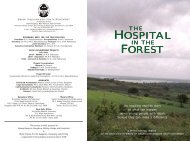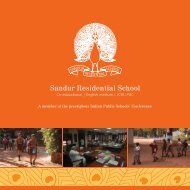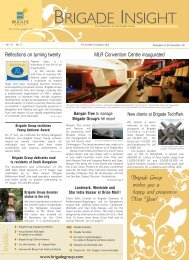Janaagraha - Resource Communications Pvt. Ltd
Janaagraha - Resource Communications Pvt. Ltd
Janaagraha - Resource Communications Pvt. Ltd
Create successful ePaper yourself
Turn your PDF publications into a flip-book with our unique Google optimized e-Paper software.
J A N A AG R A H A C E N T R E F O R C I T I Z E N S H I P A N D D E M O C A R C Y<br />
I N T R O D U C T I O N<br />
06 07<br />
informal platforms for participation have been created at the grassroots. These<br />
informal platforms—ward sabhas—are active in 15 of Bangalore's 100 wards,<br />
seeking to bring elected representative, service providers and citizens across all<br />
sections of the ward together. The processes and tools for these ward sabhas are<br />
now being streamlined based on experiences over the past 24 months. As formal<br />
laws are passed, it is anticipated that the current practice of ward sabhas will be<br />
absorbed into the proposed Area Sabha/Ward Committee structures being<br />
proposed by <strong>Janaagraha</strong> (see section on Ward Sabhas).<br />
c. Urban Poor: While all of <strong>Janaagraha</strong>'s work is inclusive and attempts to bring all<br />
citizens onto a common platform, a few specific activities were taken up focusing<br />
exclusively on the urban poor. Examples:<br />
i. Swarna Jayanthi Shahari Rozgar Yojana (SJSRY) pilot in Bangalore: An<br />
existing, reasonably well-designed but poorly-executed Government of India<br />
programme—SJSRY was taken up with the aim of resuscitating it in<br />
Bangalore. It involved four stakeholders: urban poor, government, bankers,<br />
and NGOs. There were solid outcomes in linking banks to the poor, however<br />
fewer outcomes in linking the poor into larger governance structures.<br />
ii. A common Below Poverty Line (BPL) List, pilot programme: This was done<br />
in partnership with three government agencies in three slum clusters in<br />
Bangalore—Department of Municipal Administration (DMA), Food & Civil<br />
Supplies (F&CS), Slum Board. Results indicated that common names across<br />
all three BPL lists were a startling six per cent, suggesting the need for a<br />
thorough revamp of beneficiary identification processes. The concept of a<br />
common BPL List has been proposed to the Government of Karnataka as a<br />
result of this exercise.<br />
d. Citizen leadership in children: Bala <strong>Janaagraha</strong> is in its third year, currently<br />
running in 50 schools, with close to 5000 students. This programme on local<br />
civic literacy connects school students to local communities, service providers,<br />
and includes field visits and projects.<br />
e. Signature campaigns: Two signature campaigns were conducted over the past<br />
three years; one for the Ward Works campaign which generated 1.5 lakh<br />
signatures; the second was for a campaign called Taxation with Transparency,<br />
demanding that the city not raise property taxes until full compliance on existing<br />
demands was established—this campaign generated 54,000 signatures, and was<br />
run by community leaders themselves.<br />
2. Partnerships with local governments and service providers<br />
a. PROOF (Public Record Of Operations and Finance): This is a first-of-a-kind<br />
campaign to get quarterly statements from the local government. Conceived by<br />
<strong>Janaagraha</strong>, four civil society partners were associated with PROOF in its first<br />
year, and two more joined in the second year. Quarterly discussions with hard<br />
facts are being held, among all concerned stakeholders. PROOF completes three<br />
years, and currently operates as a separate platform, with goals to both deepen its<br />
work, and expand its operations to other cities. PROOF has been recognised by<br />
both the United Nations Development Programme (UNDP) and World Bank, as<br />
among international best practices in public accountability. PROOF is now going<br />
to other cities—Nagpur.<br />
b. A joint Online Complaint Management System (OCMS): This has been<br />
implemented with Bangalore Water Supply Board and Bangalore Development<br />
Authority and is now dependent on leadership and commitment from the<br />
agencies.<br />
c. Greater Bangalore Water and Sanitation Project (GBWASP): GBWASP is a<br />
project for the provision of water and sanitation to 1.5 million residents, in eight<br />
municipalities in greater Bangalore. <strong>Janaagraha</strong> entered into a unique MoU with<br />
the state government in Karnataka, anchoring the citizen participation<br />
component—Jalamitra. For <strong>Janaagraha</strong>, this was an important partnership effort<br />
with the government, in the face of criticism from a few quarters, to establish<br />
the importance of citizen participation. Jalamitra was an important precedent to<br />
showcase how projects can be implemented elsewhere. However, <strong>Janaagraha</strong> did<br />
not hesitate in disengaging from the project when the state government did not<br />
deliver on critical commitments of the agreement. <strong>Janaagraha</strong>’s approach is<br />
consistently one of partnership but without compromising on the principles we<br />
believe in or on our ability to voice dissent.<br />
3. Volunteer activities<br />
Central to <strong>Janaagraha</strong>'s approach has been the active encouragement of volunteering,<br />
both in building values of citizenship and to continuously infuse the organisation<br />
with new ideas and energies. Since <strong>Janaagraha</strong>'s inception, over 5,000 volunteers<br />
including college students, professionals, retired people, home-makers and<br />
researchers have given time to <strong>Janaagraha</strong>, totaling over four million man-hours.















